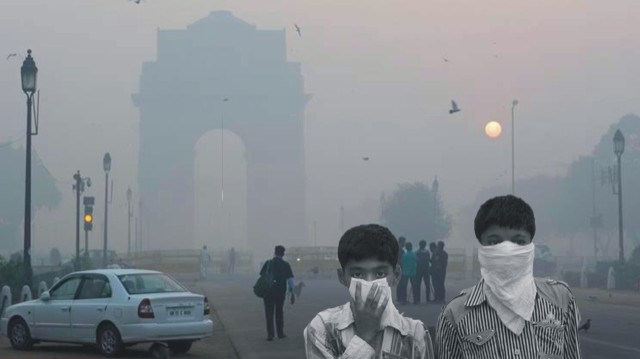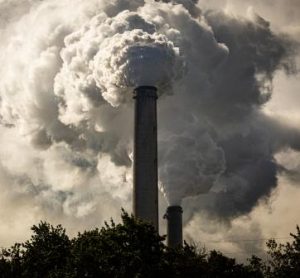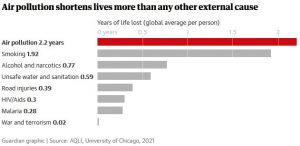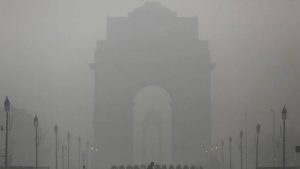

Air pollution is slashing years off the lives of billions of people according to a new report, making it a far greater killer than smoking, car crashes or HIV/Aids.
 Coal burning is the principal culprit, the researchers said, and India is worst affected, with the average citizen dying six years early. China has slashed air pollution in the last seven years, but dirty air is still cutting 2.6 years from its people’s lifespan.
Coal burning is the principal culprit, the researchers said, and India is worst affected, with the average citizen dying six years early. China has slashed air pollution in the last seven years, but dirty air is still cutting 2.6 years from its people’s lifespan.
Fossil fuel burning is causing air pollution and the climate crisis, but nations have much greater power to cut dirty air within their own borders. The climate crisis is now also adding to air pollution by driving wildfires, completing a vicious circle, the scientists said.
The team said recent events had illustrated the different futures possible depending on whether governments act or not. Coronavirus lockdowns cut pollution, revealing the Himalayas to some Indian city dwellers, while wildfires in the western US caused serious pollution on the other side of the continent in New York City.
“Air pollution is the greatest external threat to human health on the planet, and that is not widely recognised, or not recognised with the force and vigour that one might expect,” said Prof Michael Greenstone at the University of Chicago. Greenstone and colleagues developed the Air Quality Life Index (AQLI), which converts pollution levels into their impact on life expectancy.

The average global citizen loses 2.2 years of life with today’s levels of air pollution and, if nothing changes, that adds up to 17bn lost years, Greenstone said. “What else on the planet is causing people to lose 17bn years of life?”
“Furthermore, we’re not just letting it happen, we’re actually causing it,” he said. “The most striking thing is that there are big countries where, effectively, a combination of the government and [societal] norms are choosing to allow people to live really dramatically shorter and sicker lives.”
He said switching to cleaner energy and enforcing air quality measures on existing power plants have cut pollution in many countries.
The report estimated the number of additional years of life people would gain if air pollution levels in their country were reduced to World Health Organization guidelines.
 In India, the figure is 5.9 years – in the north of the country 480 million people breathe pollution that is 10 times higher than anywhere else in the world, the scientists said. Cutting pollution would add 5.4 years in Bangladesh and Nepal, and 3.9 years in Pakistan.
In India, the figure is 5.9 years – in the north of the country 480 million people breathe pollution that is 10 times higher than anywhere else in the world, the scientists said. Cutting pollution would add 5.4 years in Bangladesh and Nepal, and 3.9 years in Pakistan.
China began a “war against pollution” in 2013 and has reduced levels by 29%. This is adding an average of 1.5 years on to lives, assuming the cuts are sustained, the scientists said, and shows rapid action is possible.
The AQLI report is based on research comparing the death rates of people living in more and less polluted places, with heart and lung problems being the largest source of early deaths. The analysis is based on small particle pollution, but is likely to include the effects of other air pollutants as these all tend to be high in the same locations. ![]()
Courtesy: Guardian News & Media Ltd. To read full text of this edited version, click here.
________________________________
Also Read:
A Tale of Two CMs – Amarinder vs Arvind
Punjab – How a deadly cocktail of Agri-Water-Energy nexus going to destroy it?
Punjab Cong: Snatching Defeat From The Jaws Of Victory
Death Registers Expose The Gujarat Model Of Counting The Dead
भारत के पास अफगान तालिबान से बातचीत के अलावा दूसरा चारा ही क्या है?
Watch video:

Disclaimer : PunjabTodayTV.com and other platforms of the Punjab Today group strive to include views and opinions from across the entire spectrum, but by no means do we agree with everything we publish. Our efforts and editorial choices consistently underscore our authors’ right to the freedom of speech. However, it should be clear to all readers that individual authors are responsible for the information, ideas or opinions in their articles, and very often, these do not reflect the views of PunjabTodayTV.com or other platforms of the group. Punjab Today does not assume any responsibility or liability for the views of authors whose work appears here.
Punjab Today believes in serious, engaging, narrative journalism at a time when mainstream media houses seem to have given up on long-form writing and news television has blurred or altogether erased the lines between news and slapstick entertainment. We at Punjab Today believe that readers such as yourself appreciate cerebral journalism, and would like you to hold us against the best international industry standards. Brickbats are welcome even more than bouquets, though an occasional pat on the back is always encouraging. Good journalism can be a lifeline in these uncertain times worldwide. You can support us in myriad ways. To begin with, by spreading word about us and forwarding this reportage. Stay engaged.
— Team PT


Copyright © Punjab Today TV : All right Reserve 2016 - 2024 |